But the best organizational system for representative government is the nation state.
That has been the opinion of Vaclav Klaus, the former leader of the Czech Republic, who remarked in 2018, “For me, the Nation-State is the only possible way to have democracy. Democracy simply cannot exist at a higher level, as in continents, let alone global democracy in the world.”
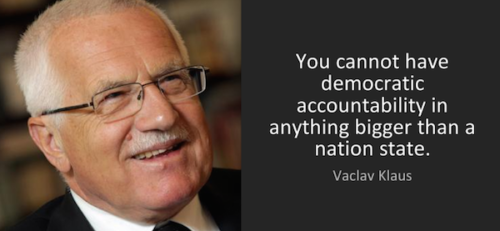
 The British leader for Brexit, Nigel Farage (pictured at right), agrees. He discussed the issue with Tucker Carlson in 2017: Nigel Farage Cheers Rebirth of Nation State. Here’s a relevant excerpt:
The British leader for Brexit, Nigel Farage (pictured at right), agrees. He discussed the issue with Tucker Carlson in 2017: Nigel Farage Cheers Rebirth of Nation State. Here’s a relevant excerpt:
FARAGE: Well you say “nationalism,” I actually call it “nation-ism” — we believe in the nation state. That is the unit we identify with; that is what we feel part of; that is what we cheer for in the Olympics; and if necessary that is what we are prepared to fight for. It embodies our values, our families, our communities, our heritage, our identity, maybe even our tribe. And I think what happened in 2016 with Brexit and with Trump, and I believe is going to roll out through 2017, is a return to normality.
Back to the present, an upbeat Farage has been doing media interviews, including one with Lou Dobbs who observed that the United Kingdom is “finally a sovereign nation once again.”
Farage is hopeful that getting Brexit pushed through will inspire more successful populist campaigns in the near future:
FARAGE: It’s a funny thing, in 2016 we had the Brexit referendum; we voted to leave — it shocked everybody. And then a few months later, guess what happened — Donald J. Trump got elected as president of the USA, and after that we saw shockwaves in Italy and elsewhere, and I think now the confirmation that Brexit has happened shows you that populism — and it may be mocked and derided by many — but populism is really popular, and I think the portents for Donald Trump’s re-election are really good.
In fact I think the whole western world is going through a transformative historical change and Brexit perhaps is the most public example of that, and I’m really excited by that because what the globalists want to do — big business, big politics, big bureaucracy — is take away our democratic rights, and this is the people’s fight back.
Here’s the full interview:
]]>
Syria had a pre-war population of around 22 million, but six million left during the conflict. First world leaders should consider population numbers before putting out the national welcome mat these days.
Anyway, one big result has been increased crime in Germany, thanks to the Middle Eastern diversity, and some Germans have departed for safer, less diverse Hungary.
Dale Hurd reported that some Germans are missing the wall bordering East Germany that was torn down with such enthusiasm 30 years ago — a wall looks like a good idea now.
]]>30 Years after the Fall of the Berlin Wall, Some Germans Want a New Wall, by Dale Hurd, CBN.com, November 11, 2019
LAKE BALATON, HUNGARY, and BERLIN/FRANKFURT, GERMANY – On Saturday the world celebrated the thirtieth anniversary of the fall of the Berlin Wall, which led to the reunification of Germany.
But what has Germany become? Not what some had hoped. And the proof of that can be found in Hungary, about two hours west of Budapest, at a place called Lake Balaton. Why mark the thirtieth anniversary of the fall of the Berlin Wall from a lake in Hungary? Because it’s where a lot of Germans have fled to who are fed up with Angela Merkel’s new Germany.
Germans Fleeing Migrant Crime
The Lake Balaton region is full of Germans who have moved here for all sorts of reasons, but a local real estate agent told us the biggest reason is migrant crime in Germany. ”At the moment our clients are 80 percent German,” Hungarian Real Estate Agent László Kozma told us, “And the main reason is the immigration problem in Germany.”
Kozma says the number of Germans moving to Lake Balaton spiked immediately after Chancellor Angela Merkel allowed over a million mostly Muslim asylum seekers into Germany in 2015, while Hungary has turned migrants away.
“Yes, yes, yes, this is the reason,” Kozma says. “They want to escape to Hungary and live here permanently.”
They include Germans like Gerhardt Boehm, who told us he would never move back. He feels safe in Hungary.
Kozma says there currently are not enough properties in the area for all the German buyers. (Continues)
Let’s consider. For years, persons concerned about the mass [...]]]>
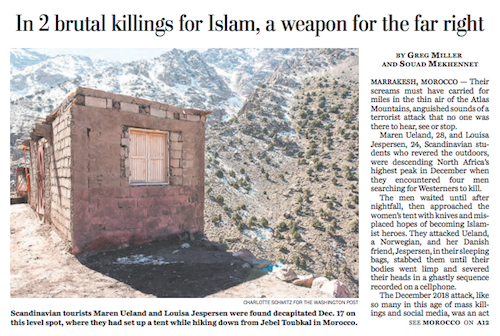
Let’s consider. For years, persons concerned about the mass immigration of hostile muslims have pointed out that the “religion” of Islam is more correctly understood as an all-encompassing political system. Dutch political leader Geert Wilders lives under 24/7 security because jihadist thugs in Europe have decided he needs to be murdered due to his resistance to the ideology. When Wilders gave a 2015 speech in Garland, Texas, he had a SWAT team of eight well armed men guarding him.
Wilders discussed the political nature of Islam in a 2017 interview, reviewed in Breitbart.com: Geert Wilders: Islam Is Not a Religion, It’s a Totalitarian Ideology:
GEERT WILDERS: Islam as an ideology does not allow freedom. Look at almost all the countries in the world where Islam is dominant — you see a total lack of civil society, of rule of law, of freedom for journalists, women, Christians, or even somebody who wants to leave Islam, an apostate.
You are allowed to leave Christianity or Judaism and become an atheist or the follower of another religion; you are not allowed to leave fascism, you are not allowed to leave Communism. And still today in Holland, in Germany, in the Arab world, the penalty is death if you want to leave Islam.
And let’s not forget the extreme violence, the murders where muslims kill nonbelievers because the koran says to do so in over 100 verses. There are so many examples — like the 9/11 attacks that killed nearly 3000.
It was so shocking that America pledged never to forget.

But the Washington Post has forgotten that Islam is a historic opponent of the West, and the paper should not condemn those of us who do remember and name the enemies of free people.
Perhaps if the press were not so politically correct in protecting the reputation of hostile Islam, the two young women would have thought twice about a hiking trip in Morocco (99 percent muslim). The media adoration of diversity uber alles does not stand up under scrutiny.
Below, Norwegian Maren Ueland (left) and Dane Louisa Vesterager Jespersen were murdered in Morocco by jihadists.

Murder in the Atlas Mountains, Washington Post, June 21, 2019
In a crime apparently intended to impress the Islamic State, two Scandinavian women were brutally slain in Morocco. The killings were seized on by the far right to attack Islam.
MARRAKESH, Morocco — Their screams must have carried for miles in the thin air of the Atlas Mountains, anguished sounds of a terrorist attack that no one was there to hear, see or stop.
Maren Ueland, 28, and Louisa Jespersen, 24, Scandinavian students who revered the outdoors, were descending North Africa’s highest peak in December when they encountered four men searching for Westerners to kill.
The men waited until after nightfall, then approached the women’s tent with knives and misplaced hopes of becoming Islamist heroes. They attacked Ueland, a Norwegian, and her Danish friend, Jespersen, in their sleeping bags, stabbed them until their bodies went limp and severed their heads in a ghastly sequence recorded on a cellphone.
The December 2018 attack, like so many in this age of mass killings and social media, was an act of senseless and performative violence. The killers, poor and uneducated, became absorbed in a violent Islamist universe they saw on the screens of their cellphones, then sought their own place in it. Their overriding aim was to impress the Islamic State, earn the status of soldiers in its apocalyptic struggle and see their own recording distributed across the group’s propaganda platforms.
Reality didn’t follow that script. The targeting of defenseless women and the abysmal quality of the recording managed to violate the standards of a terrorist group not known for having any. The Islamic State did not distribute the video, refused to acknowledge the attack and to this day has ignored the Moroccans’ pledges of loyalty.
The video went viral nonetheless. An attack that had gone unheard and unseen ended up being viewed millions of times by Islamic State supporters who didn’t share the group’s selectivity, by dark-Web bottom dwellers devoted to gore and by the morbidly curious.
The most alarming audience, however, was one that the attackers had not envisioned. Within days, the one-minute, 16-second recording spread rapidly across networks associated with the far-right and white-nationalist movements. Extremists posted gruesome scenes of the women’s deaths on Facebook, Twitter and other platforms alongside condemnations of Islam and calls for a civilizational clash.
“Look at this video of the one girl being decapitated alive,” wrote a far-right figure in Norway as he posted a link to his Twitter account. “It’s God awakening us Germanic men to action. It’s enough now. It’s enough.”
When officials in Norway and Denmark pleaded with the public to stop sharing the video, that effort was denounced by far-right groups as a betrayal of religion and race — censorship of content that revealed the true nature of Islam.
For families of the victims, the aftermath compounded the pain. Their mothers were inundated with messages on Facebook. Many were expressions of condolences, but some were gestures of astonishing cruelty, saying their daughters deserved to die and attaching links to the video of their slaughter.
The attack in Morocco was not of the same magnitude as the mass shooting that killed 51 people at mosques in New Zealand three months later, or the Easter bombings in Sri Lanka five weeks after that, when more than 200 people attending church services were killed. But all are part of a pattern of violence and viral incitement in which the extremes of intolerance react to and further radicalize one another online.
In the Moroccan case, a video that was created to strike a blow for Islamism was almost immediately repurposed and weaponized by those who consider the religion an existential threat to the ethnic and cultural identity of Northern Europe.
The victims were caught between warring ideologies that they had rejected in life. In the days after the attack, far-right activists scoured the women’s social media accounts and mocked them for their tolerant views.
“It is obvious to point out the naivete of the two deceased, but they are, as all, a product of their upbringing,” said an entry on Uriasposten, a Danish, anti-Islamic website. “Perhaps the eternal struggle against ‘prejudice’ has unpleasant side effects.”
This account of the attack in Morocco and its aftermath online is based on Moroccan court records including statements from the suspects; interviews with officials in Morocco, Norway, Denmark and the United States; and friends and relatives of the victims and of the suspects in their deaths. (Continues)
]]>
Peter Caddick-Adams presents a brief review of how close a thing the invasion was, how easily it could have been a disaster if the many deceptions had failed to make the Germans think [...]]]>
Peter Caddick-Adams presents a brief review of how close a thing the invasion was, how easily it could have been a disaster if the many deceptions had failed to make the Germans think Calais was the target rather than Normandy.
But even with the remembered heroism, it’s hard to see the Greatest Generation passing away with the years. The coming D-Day will be the 75th anniversary, and fewer than 500,000 WWII veterans are alive today out of more than 16 million who served.
Below, Dick Winters (1918 – 2011) is remembered for leading an assault that took out a battery of German guns that threatened the Normandy invasion.

Fortunately, the invasion succeeded and Europe was saved from German fascists. (Only now, the continent is threatened by muslim fascists who were invited by Chancellor Merkel — also noticed by PragerU with its video of Douglas Murray’s remarks.)
But back to today’s video and its transcript:
]]>There were 36,525 days in the twentieth century. Of these, none was more consequential than June 6th, 1944. D-Day: the Allied invasion of Normandy in Nazi-occupied France. It did not end World War II, but without it, the Nazi war machine would not and could not have been defeated.
We, of course, know the good guys – America, England and its allies – won. But in 1944, there was no certainty of success. In fact, there was just as much doubt as confidence. Winston Churchill’s senior advisor, Field Marshal Brooke, wrote in his diary, “I am very uneasy about the whole operation. It may well be the most ghastly disaster of the whole war.”
Brooke’s fears were entirely reasonable.
First there were tens of thousands of men and millions of tons of material and supplies that had to be moved one hundred miles across one of roughest bodies of water in the world – the English Channel. And it had to be kept secret. If the Germans knew where and when the allies were landing, they could mass forces against them and turn the beaches of northern France into killing fields.
To prevent this, the Allies took every possible precaution. Their air forces destroyed bridges, roads and railways that might be used by the Germans to rush troops to the invasion site. Everyone knew the attack was coming; the key was to keep the Germans guessing.
Fake radio chatter was broadcast to suggest the beaches near Calais would be the landing point. Double agents leaked fake details of units forming in South East England. And movie set designers built phony tanks, planes and ships to support the ruse of an army preparing to cross near Dover for the benefit of German reconnaissance pilots and spies.
The Germans swallowed it all. But the Nazis were not the only enemy the Allied forces faced. Mother Nature was just as threatening.
The 23,000 paratroopers and glider-borne infantry jumping into Normandy needed moderate winds to be effective. The twelve thousand Allied aircraft needed clear skies. The invasion fleet of six thousand vessels needed calm seas. And there had to be a low tide to expose Nazi obstacles and mines. When high winds and rain began pummeling the Channel, Allied supreme commander General Dwight Eisenhower postponed the invasion date of June 5th by twenty-four hours. That might not sound like a significant delay, but it was. All forces were concentrated and ready to go. All the plans, all the deceptions, could be exposed at any moment. Then came a new forecast. The weather appeared to be breaking. There might be a 12-hour window of opportunity.
Eisenhower gave the order: We go. Immediately, the greatest invasion fleet ever assembled set sail. On board were over 130,000 young soldiers.
Consider for a moment who these soldiers were. The average age of the American GI was 21. Most had never seen combat or even been fifty miles from their hometown. As they sailed toward the French shoreline, Eisenhower wrote a press release in case of catastrophe. D-Day was an all-or-nothing affair. A new invasion strategy would take months, if not years, to devise.
The initial battle reports were seriously troubling. At Omaha Beach, overlooked by cliffs honeycombed with trenches, cannon and machine-guns, the Americans took heavy losses. “I might have killed hundreds that morning,” reflected German soldier Hein Severloh, manning one of the bunkers. The rough surf also took its toll. Dr. Harold Baumgarten, with the U.S Army’s 116th Infantry, remembered, “Some of the fellows were pulled under by their wet combat jackets and heavy equipment. We couldn’t help; they just drowned.” Further along, Army Rangers also took heavy casualties as they scaled the cliffs under intense gunfire. However, by mid-day – with US naval support – the Germans, low on supplies and ammunition, began to fold. Nazi reinforcements, including hundreds of tanks, which might have made all the difference, were not ordered to Normandy until the afternoon. Before the Germans could mount an effective counter-attack, the Allies had secured all five landing beaches.
Churchill had expected twenty thousand to be killed on D-Day. Fortunately, heavy though they were, the losses were much lower. Of the 156,000 Allied personnel who hit the beaches that day, ten thousand became casualties. Of these, five thousand were killed.
No one died in vain.
Their sacrifice meant an end to Nazi Germany and the Holocaust. Another year of bitter fighting lay ahead, but D-Day – June 6, 1944, was a pivotal step on the road to forever removing the Nazi tyranny from Europe and the world.
I’m Peter Caddick-Adams, author of Sand and Steel: A New History of D-Day, for Prager University.
The PBS Newshour report was typical of the liberal press with its snooty characterization of Orban. NPR called him “Hungary’s authoritarian prime minister” and USA Today thought it was cute to quote [...]]]>
The PBS Newshour report was typical of the liberal press with its snooty characterization of Orban. NPR called him “Hungary’s authoritarian prime minister” and USA Today thought it was cute to quote critics’ nickname “Viktator” even though he has been elected fair and square more than once.
One suspects that Orban’s tough enforcement against illegal immigration is the real source of media disapproval. The press loves the fake generosity of open borders that harm only people far away from the nation’s elite newsrooms.
The PBS report discussed the immigration issue, though without mentioning that the oppressive Islamic Ottoman Empire controlled part of medieval Hungary for over a century, so Hungarians are not kindly disposed toward muslims like the thousands of diverse refugees who arrived a few years back. Memories are long in Eastern Europe.
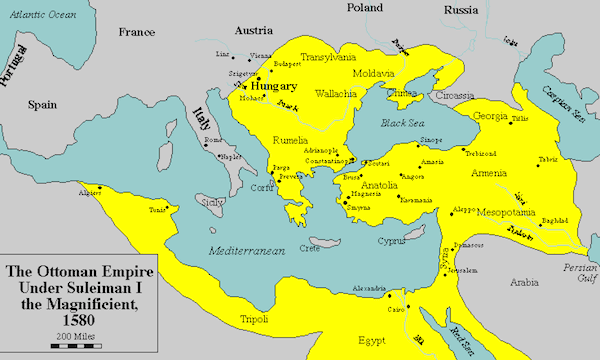
Here’s the PBS report:
]]>Why Trump’s meeting Hungary’s Orban is a ‘bit controversial’
JUDY WOODRUFF: President Trump welcomed another controversial leader to the White House today. He is Prime Minister Viktor Orban of Hungary.
Orban has roiled Europe with his populism, his restrictions on immigration, and anti-democratic moves in order to consolidate power in Hungary.
William Brangham has the story.
WILLIAM BRANGHAM: It was Viktor Orban’s first visit to the White House in 20 years, and he found a like-minded leader in President Trump.
DONALD TRUMP: Probably like me, a little bit controversial, but that’s OK. That’s OK. You have done a good job. And you have kept your country safe.
VIKTOR ORBAN: And I would like to express that we are proud to stand together with the United States on fighting against illegal migration, on terrorism, and to protect and help the Christian communities all around the world.
BRANGHAM: In the 1990s, when he visited President Clinton, Orban was seen by many as a democratic reformer, helping steer his country out of the Soviet era. He returned to power in 2010, but, this time, as a right-wing populist and nationalist.
ORBAN (through translator): European culture based on Christian values must be given primacy on the European continent. Europe’s borders must be protected against the invasion of migrants.
BRANGHAM: Where President Trump has called for a wall at the U.S.-Mexico border…
TRUMP: We’re going to build a big beautiful wall.
BRANGHAM: … Orban actually closed Hungary’s southern border with barbed wire after mainly Syrian refugees surged by almost 450 percent in 2015.
ORBAN (through translator): The biggest danger of all is the immigrants in their millions who are threatening us from the south. That’s the truth. We built the fence. We defended the southern border.
BRANGHAM: While lines lengthened at the border, and pleas for help grew, grants of asylum in Hungary dropped drastically. Many of the refugees already in Hungary were deported to Serbia.
MOHAMMAD ARAB: They told us that you need to leave Hungary immediately, right now, or we will deport you back to Afghanistan. The police officers are really bad. They treat us like we’re not humans, like animals.
BRANGHAM: Last year, Janos Lazar, then a top official in Orban’s Cabinet, made this video in Vienna, Austria, about the growing Muslim community there.
JANOS LAZAR (through translator): The white Christian Austrians moved out, and the immigrants took control of this neighborhood. If Hungarians let them in and let them live in our cities, there will be a higher crime rate, impoverishment, filth.
BRANGHAM: Then came an anti-immigration campaign targeting European Commission President Jean-Claude Juncker, as well as Hungarian billionaire George Soros.
Orban’s increased crackdown on the Hungarian media has also created strain with the E.U. The Committee to Protect Journalists warns that Orban has — quote — “crippled the independent press” and is a — quote — “threat to the E.U. as an institution.”
But there was no such criticism in the Oval Office today, as President Trump pressed to loosen Hungary’s reliance on Russia and China, and build closer ties with the U.S.
For more on what this newfound alliance means for Hungary and for Europe more broadly, we turn to Charles Kupchan. He was the senior director for European affairs on the National Security Council staff during the Obama administration. He is now a senior fellow at the Council on Foreign Relations and a professor at Georgetown University.
Welcome back to the “NewsHour.”
CHARLES KUPCHAN: Good to be with you.
BRANGHAM: For people who have not been following Viktor Orban’s career or really appreciate where he sits in the orbit of European politics, tell us a little bit more about him.
KUPCHAN: Well, as your piece said, he starts off as a disheveled liberal post-communist progressive.
He has one bite at the apple as prime minister from ’98 to 2002. And then he comes back in 2010. And he’s been there ever since. And he essentially tracks from the left to the right to the further right over the course of his political career, and, in many respects, is a person that’s ahead of his time, in the sense that he became anti-immigrant, anti-Europe, close down the borders, take over the media, compromise the independence of the judiciary, well before it became mainstream.
You now see it happening in Poland, in Italy. The far right is gaining ground in Germany. It’s a widespread phenomenon. He was in many respects the person who blazed that path.
BRANGHAM: Former Trump senior adviser Steve Bannon once referred to Viktor Orban as Trump before for Trump. Is that an accurate characterization of him?
KUPCHAN: There’s no question that there is an ideological affinity between Trump and Orban.
There is, I think, an effort to create what you might call an illiberal alliance, in which Trump sides with Orban, Salvini, the head of the League in Italy, Kaczynski, the head of what’s called Law and Justice Party in Poland, Alternatives for Germany in Germany, the National Rally in France.
They’re trying to create a political movement that pushes democratic politics to the right and in the anti-immigrant direction. I don’t think it’s any accident that this meeting today occurred less than two weeks before votes for the European Parliament.
It’s a bellwether election. No question that the far right, the anti-E.U., the anti-immigrant forces will gain ground. The question is, how much ground will they gain? How much influence will they wield in the new Parliament?
BRANGHAM: Given that, what impact does Viktor Orban sitting there and getting this warm embrace from President Donald Trump actually mean for our bond and the E.U.?
KUPCHAN: No question that it’s a big bump for Orban. He made it into the Oval Office.
Trump, to some extent, is letting him out of the penalty box, because he’s been shunned for a long time. In fact, the E.U. has been going forward with what’s called Article 7, explicit legal sanctions against Hungary for its anti-democratic behavior.
So, this is basically letting him back in at the seat with the big boys. Second thing is, I think this will help populists across Europe, because they will look at Orban and they will say, hey, this guy has momentum. Let’s go to the polls.
The one thing that I would say as a caveat is, a lot of Europeans aren’t going to like this meeting. Some of them may go to the polls later this month and vote for centrist parties precisely because they don’t like Trump, they don’t like the fact that he’s interfering in European politics. So it’s difficult to say exactly how this will play.
BRANGHAM: What about the argument that is made that, as I touched on very briefly, that Orban and Hungary is turning to be a little closer to China and a little closer to Russia, and so that there is value in President Trump trying to hold him a little closer to the democratic West?
KUPCHAN: Well, I think the main impact of this meeting is this symbolic one that we have been talking about, but there will be a traditional component to this in the meeting today.
One of it has to do with China. The Chinese are building Belt and Road. They are investing in Hungary. Hungary is considering bring in Huawei, the large Chinese telecom company, to build its 5G network. The United States doesn’t like that because of security concerns.
Orban has been very close to Putin. He has invited Putin to Budapest on several occasions. Trump probably is OK with that, because he also likes Putin. But I think in many respects the Trump administration may see it going a little bit too far. He, for example, has stood in the way of NATO cooperation with Ukraine. The Trump administration has been supporting Ukraine.
There will also, I think, be as part of the agenda a discussion of energy in the region, the Central European energy corridor. And Trump has also wanted to sell arms to Hungary, get rid of their Soviet arsenal. So I’m guessing that, earlier today, he pushed him on that front as well.
BRANGHAM: Charles Kupchan, thank you, as always.
KUPCHAN: My pleasure.
When Mona arrived in Sweden as a refugee [...]]]>
When Mona arrived in Sweden as a refugee at age 19, she “discovered” the truth about Islam from reading its book, that it is a religion of violence and repression. That knowledge put her on a spiritual and political journey which Dale Hurd documented several years ago in a CBN story:
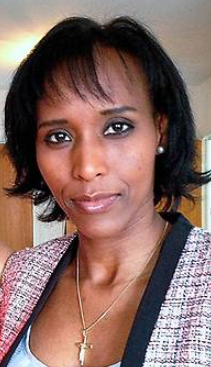 Now she has converted to Christianity and is warning her new country about the dangers of her previous faith, which can be better understood as a wholistic political system, one not friendly to democratic rights and values.
Now she has converted to Christianity and is warning her new country about the dangers of her previous faith, which can be better understood as a wholistic political system, one not friendly to democratic rights and values.
Here’s a recent report on Mona and her efforts to wake up Swedes from their apparent belief that Diversity is the highest good. It isn’t, particularly when muslim immigration is concerned.
]]>Ex-Muslim: “Swedes will lose Sweden in 50 years” Voice of Europe, April 11, 2019
Mona Walter is a Somali woman who came to Sweden in the 90’s. In Somalia, she had never been religious, but in Sweden she was more or less forced to go to the mosque and wear a hijab.
After a couple of years she rebelled, left Islam and became an atheist. Eventually she came to believe in Jesus and converted to Christianity.
“For many years I have tried to get the Swedes to understand what the Muslim goal is – to take over your country. The first thing they will do is demand sharia courts, just like in the UK”, she says.
But the mainstream media does not want to listen to Mona Walter. They call her controversial and most Swedes turn away from her message, which they perceive as too frightening, according to the news blog Ingrid and Maria.
“Swedes are so convinced that Swedish laws will always apply in their country. But ask any Englishman if he 30 years ago would have believed that Britain would have legal sharia courts in 2019. No one would have thought it possible.”
“If Sweden recognises Sharia courts the Muslims will have new demands, like permission to rule their own enclaves without interference from the Swedish society. The end goal is for Sharia to rule all of Sweden.”
[. . .]
But no one seems scared by the fact that Sweden now have approximately one million Muslims in the country, of which many have infiltrated the political parties to promote their own interests. The question is when Muslims will form their own party in Sweden.
In Belgium the Islam Party has been very successful over the last few years, with political goals like making the country a “100 percent Islamic state” and introducing Sharia law. They say Belgium will have a Muslim majority in only 12 years.
“The only solution for Sweden is to start a mass repatriation of people who think everything here is “haram”, that don’t want to become a part of society and refuse to assimilate.”
“If we don’t do that, Islam will take over in 50 years. The demography is very clear – in 100 years it’s game over”, Mona concludes.
Curiously forgotten is how Merkel declared in 2010 that multicultural society had “utterly failed” in Germany. Yet a few years later she reversed her view entirely and went extreme open borders. How quickly political leaders change their tune completely when it suits them.
Germany has become a prime example of how unwise, excessive immigration can profoundly damage a society through increased violent crime, disorder and political conflict. Modern life is complex enough without adding more variety.
Below, Below, Kandel townspeople demanded that “Merkel must go” as they protested the brutal murder of a 15-year-old girl by an Afghan asylum seeker who claimed to be a minor but was believed to be an adult.

Tucker Carlson discussed diverse immigration in Germany with Richard Grenell, the US ambassador there. A sensible fellow, Grenell is surprisingly plain-spoken for a diplomat, although he relies on the numbers argument against failed immigration and doesn’t mention the unfriendly culture of the new residents, many of whom answer to allah.
]]>TUCKER CARLSON: America isn’t the only country facing economic pressure and social volatility from unrestrained immigration. Just three years ago Europe faced its own wave of migrants from Africa and the Middle East. the German Chancellor Angela Merkel responds to this by accepting nearly a million migrants in a single year. Adjusted for population that would be like this country taking in four million in twelve months.
Three years after that, how has that decision affected Germany and Merkel’s political career? Rick Grenell is the current ambassador to Germany and is joining us. Thank you for coming on.
AMBASSADOR RICHARD GRENELL: Of course. Thank you for having me.
CARLSON: You are seeing the figures on the left, Hillary Clinton and John Kerry most prominently, but others rethinking the political fallout of Merkel’s decision to do that in Germany. From where you sit, what was the effect of letting in those migrants?
GRENELL: First of all, let’s talk about the political effect. There was no plan in place, so the policy really fell apart. Chancellor Merkel and many in Germany had big hearts. They wanted to do something, but there wasn’t a plan, and so, even Chancellor Merkel all these years later has agreed that there was no plan, and therefore the entire policy fell apart. It wasn’t implemented with hardcore security measures and follow-up, so from the political standpoint, next week, Chancellor Merkel is giving up her chairmanship of the party. There are three other people running and the top issue is migration and her handling of migration. Politically I’d say it toppled her and has forced her now to give up the chairmanship of a party she once ran with a very strong arm.
CARLSON: What’s so interesting watching Germany from here is how the German press and its cultural leaders responded. This was three years ago, and it was immediately obvious ordinary Germans didn’t like it, and it caused the crime rate to go up and it was causing economic pressure on ordinary Germans. But people weren’t allow to say that for a number of years in public, or am I misreading it?
GRENELL No, you are exactly right, and I’d go so far as to say we still have that problem in Germany. there is still an overreaction if you complain about wanting secure borders or just an orderly process.
This is not about whether you have a heart; this is whether or not you have a plan, and we in the United States know a million people a year get US citizenship. We are very generous; this is not about not wanting immigrants. And the whole idea that the left or some on the right even, or the media are mixing up legal immigration with illegal immigration is really an outrage, and those of us in the public policy positions have to be able to push back and say look, we’re not talking about legal immigration. The United States is very generous. Germany has been very generous. This is about whether or not you have a plan because not everyone is going to be able to come.
That’s what you have to be able to say. we must prioritize. What is that number? One million people in the United States? is it four million people in Germany over a number of years? What is that number, because whatever that number is, it’s still going to be too low. You are still going to turn people away. So let’s have an orderly process and figure out how to do legal immigration and do it the right way.
CARLSON: I think that is what we need in the United States — an honest adult conversation about what we can afford, what is good for your country and what the next hundred years looks like demographically. We can’t have that conversation here. Can Germans have it?
GRENELL: Look, I think the United States is having a better conversation than Germans to be honest. This has largely been controlled by elites in Berlin, but normal, everyday people are beginning to say wait a minute, this policy is not working. This is not about being generous; we are very generous. They have a lot of open borders throughout Europe, but I would also argue that the mistakes of Germany, Tucker, rippled throughout all of Europe because we have seen in Austria with Sebastian Kurz who came in with a platform to say we need security and a set of rules. This is not about not being generous; this is not about not being open to immigrants, but this is about just having rules. Once he established that he wanted rules, Sebastian Kurz won in a very big way and is now becoming very popular throughout Germany.
So while some in the media in Germany will try to push this into saying you are a radical far right person, the reality is that normal everyday Germans and Europeans are clamoring for leaders who wants to have safe and secure borders and an orderly process.
CARLSON: If they want to create radicals, they should keep lying to the population because that’s what they are going to get.
Naturally, these spots are a target for invasive Africans hoping to arrive in the freebie paradise on the mainland. Spain has [...]]]>

Naturally, these spots are a target for invasive Africans hoping to arrive in the freebie paradise on the mainland. Spain has unwisely been friendly to the aliens or, as Reuters reported in July, Spain emerges as EU’s new weak link for Africa migration.
Spain is seen by muslims as their territory because there was an Islamic presence there in the past. So some of the Africans who are muslims may well regard their illegal presence in Spain as a righteous jihad to reclaim Al Andalus for allah.
In fact, the process of re-Islamization is well underway in some communities, according to a 2012 report from Dale Hurd.
On Monday, the New York Times front-paged a story about the stresses on the little Spanish enclaves from illegal alien Africans seeking to mooch a better life in Europe.

That article was reprinted elsewhere, so click away to read the whole thing:
‘All of Africa Is Here’: Where Europe’s Southern Border Is Just a Fence, LiveNewsCity.com, August 19, 2018
CEUTA, Spain — For most migrants from Africa, the last stage of their trip to Europe involves some sort of perilous sea crossing. At the border in Ceuta, there is just a fence.
Ceuta (pronounced say-YOU-tah) is one of the two Spanish communities on the north coast of what otherwise would be Morocco, the only places where Europe has land borders with Africa. The other enclave is Melilla, farther east along the same coast.
Here, all that separates Europe from migrants is a double fence, 20 feet high and topped with barbed wire, stretching the four miles across the peninsula and dividing tiny Ceuta from Morocco — plus 1,100 Spanish federal police and Guardia Civil officers, a paramilitary police force.
They patrol a crossing point that has come under growing pressure.
After Italy’s new government closed the door to migrants, efforts to cross into Spain have more than quadrupled in 2018, making it the No. 1 European destination for migrants from Africa.
In the week ending Aug. 12, according to the International Organization for Migration, 1,419 migrants reached Spain, compared with 359 to Italy and 527 to Greece.
But the sea crossing to Spain, through the narrow straits of Gibraltar, is more dangerous than other passages, because of strong currents where the Mediterranean Sea meets the Atlantic.
Through June, 294 migrants drowned in the western Mediterranean, compared with 224 in all of 2017 in that area.
That has made trying to breach Ceuta’s heavily guarded fence an increasingly attractive proposition, a way to enter Spain without crossing the water. On any given day, young migrant men can be seen prowling on the Moroccan side, looking for an opportunity.
Some swim around the fences where they go down into the sea. Others take short, illicit boat trips from Morocco to Ceuta. But mostly they run and climb the fence, or use bolt-cutters to cut holes in it, where they are quickly spotted by motion detectors and guards in observation towers, and usually beaten back by policemen using sticks and fists.
Salif, 20, from Cameroon, said he tried 10 times to cross the fence in the past year, until he finally made it over on his 11th effort.
As often happens, successful tries are made by what locals call “mobbing,” when hundreds of migrants surge over the fence in a large group. Salif’s group came on June 6, when 400 young men began climbing the fence at sunrise.
Two were seriously injured on the barbed wire, and hospitalized in Ceuta. Eight, including Salif, managed to get over, and were then allowed to stay in a reception center in Ceuta, awaiting transfer to the mainland.
There, they can apply for asylum, a process that can take many months or even years. Most will be turned down, and the deportation process is slow and difficult.
While people often do get hurt trying to pierce the fence, deaths are rare.
“All of Africa is here,” said Salif, ticking off migrants he has met from Angola, Nigeria, Senegal, Burkina Faso, Ivory Coast, Benin — and even some from Pakistan and Bangladesh.
And they keep coming.
“Trying to stop migrants coming from Africa with a fence alone is as fanciful as the little Dutch boy who saves his country by putting his finger in a leaking dike,” said Leonard Doyle, the spokesman for the International Organization for Migration. (Continues)
Europe better figure out how to keep Africans out or else it will become a very different place for tomorrow’s generations.
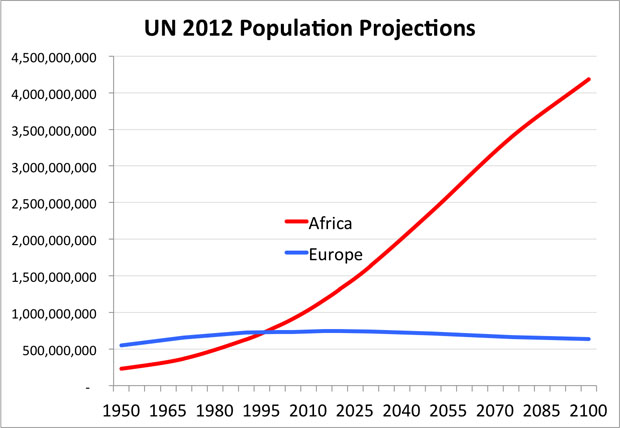
It has been a long time coming to resist the noisy shaming strategy of the invaders, but the political climate has changed a bit over [...]]]>
It has been a long time coming to resist the noisy shaming strategy of the invaders, but the political climate has changed a bit over the last few years. Perhaps wimpy Europe may be discovering the resolution to defend its own culture.
In addition, Islamic style “modesty” can be a convenient disguise for crime and jihad terror, as Daniel Pipes has brilliantly displayed in a list started in 2002 and updated this month — Niqabs and Burqas as Security Threats.
Burqas can be an aid to jihadist intimidation and the demands of Islamic invaders.

A few years ago, the Philadelphia “burqa bandit” robbed at least five banks disguised by a handy full body covering. Pictured below, the robber has a rather masculine build.

The Washington Post story was reprinted by the Sydney Morning Herald in Australia, where muslim immigration has been problematic:
]]>Bans on full-face Muslim veils spread across Europe, Sydney Morning Herald, By Rebecca Tan (Washington Post), August 17, 2018
Washington: Earlier this month, Denmark became the fifth country in Europe to introduce a ban on face coverings in public places. The policy is widely viewed as being targeted at Muslim women who wear veils such as the niqab.
Despite protests in the capital, Copenhagen, police have started enforcing the law in earnest. On August 3, a 28-year-old wearing the niqab, which covers the entire body except the eyes, was attacked by another Danish woman who tried to pull her veil off, the Guardian reported. Police fined the Muslim woman $US156 ($214).
Legislation around full-face veils has grown increasingly common in Europe, particularly in the past three years. Six countries have now passed nationwide laws that partially or fully ban face veils in public places. The latest is the Netherlands, which voted in June to partially ban face veils in locations such as schools and hospitals, but not on public streets.
Several other European countries, including Spain and Italy, have banned them in individual cities and towns, and even more have reviewed proposals for bans at a local or national level.
Widespread calls for legislation outlawing face veils in public places started in France, which in 2011 became the first European country to introduce a nationwide ban. At the time, French President Nicolas Sarkozy argued during a state-of-the-nation address that the burqa — a head-to-toe covering with mesh screening the eyes, mainly worn in Afghanistan — was a “sign of subservience and debasement.”
“I want to say solemnly, the burqa is not welcome in France. In our country, we can’t accept women prisoners behind a screen, cut off from all social life, deprived of all identity. That’s not our idea of freedom,” Sarkozy said to rapturous applause from lawmakers, the Guardian reported.
Another common justification for the ban is that face veils conceal the wearer’s identity, posing a security threat. (Continues)
It’s curious that the press persists in calling such [...]]]>
It’s curious that the press persists in calling such persons “migrants” rather than “invaders” or “marauders.”
Below, invasive Africans climb a fence to enter an outpost of Spain on the continent of Africa.

Dale Hurd of CBN explains further:
Sweden has been willing to acquiesce to the will of the European Union that the illegal aliens be accepted and resettled.
]]>Feces and Flamethrowers: Migrants Storm Gates of Europe as Muslim Radicalism Spikes 900% in Sweden, CBN.com, by Dale Hurd, July 30, 2018
Roughly 800 Africans stormed the border wall separating a Spanish enclave in Africa and Morocco last week. The migrants threw Molotov cocktails and feces at border guards and used lighters and aerosol cans to make flamethrowers. Once inside Spanish territory, they threw rocks at cars.
The European Union continues to try to force member states to take in the mostly Muslim migrants from Africa and the Middle East, but those who do now face soaring welfare costs, crime and terrorism.
The migrant issue has become a wedge dividing the European Union. The EU is still trying to punish nations who refuse to take Muslim refugees, but those who are – nations like Sweden – are paying a stiff price.
Most of the time Sweden looks like it’s functioning normally, but intelligence reports indicate the nation is sitting on a ticking time bomb of Muslim terrorism. A new report says Muslim radicalism in Sweden has increased by 900%.
Swedish terrorism expert Magnus Norell at the Washington Institute for Near East Policy says the chickens have come home to roost on Sweden’s open door immigration policy: “Our forecast is unless, unless we deal with this fairly soon, I mean head on, it’s gonna get from bad to worse I think.”
A report last year said crime in Sweden was on par with Mexico. And a new study by the European think tank Gefira says the native white Swedish population will be a minority within a maximum of 40 years.
But rather than addressing the problem, Sweden continues to shoot the messenger. In the latest case, a dental hygienist reported to government authorities that the teeth of some of his migrant patients showed that they were not children as they had claimed, but adults. He was fired and fined over $50,000. (Continues)